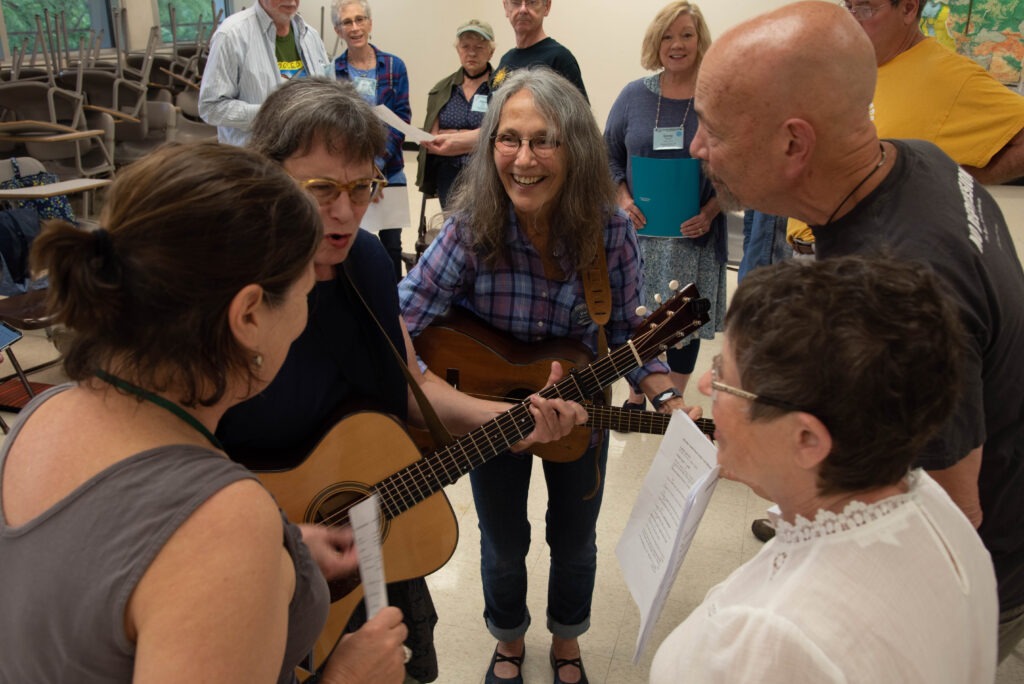
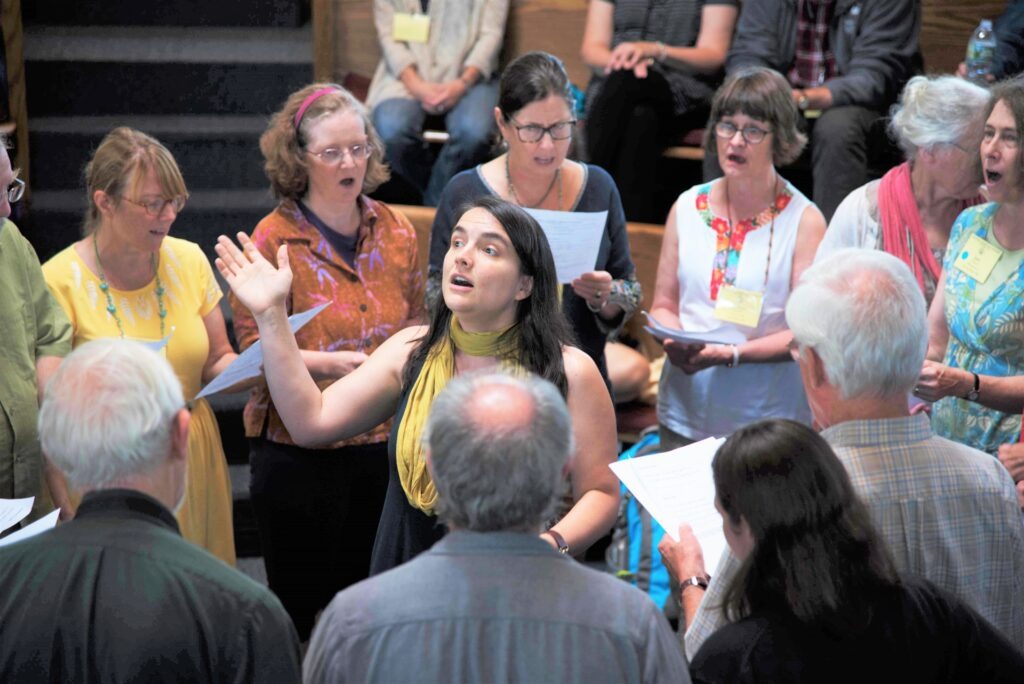
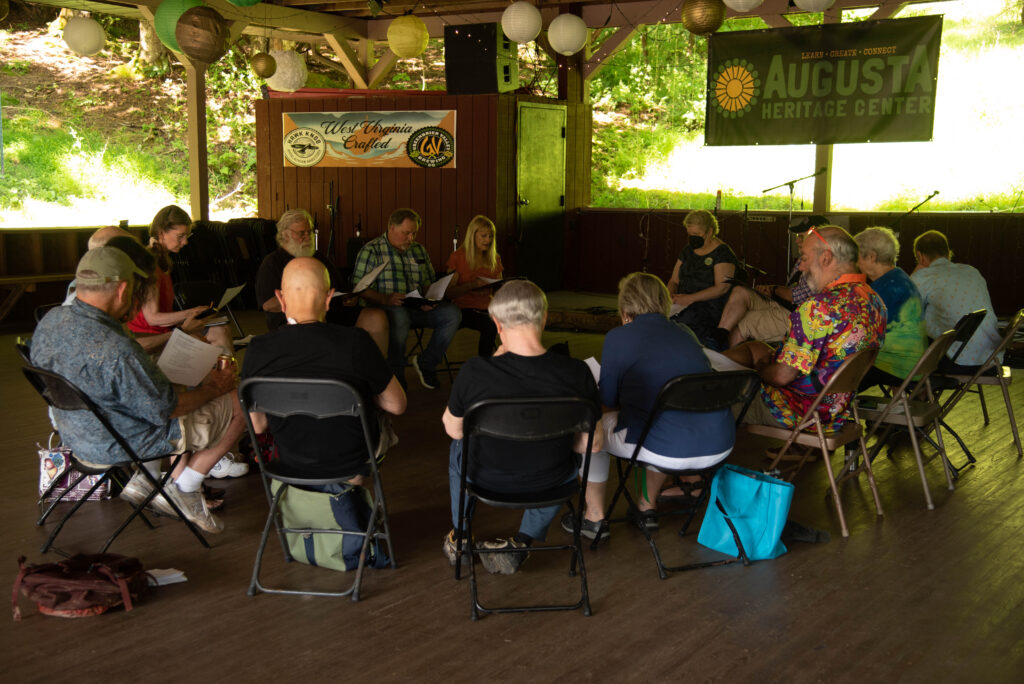
Whether it’s the rich harmonies of the all-group sings, the intricate stylings of solo singing learned in a class, or a serendipitous collaboration with a new singing buddy in a jam, Vocal Week offers a diverse range of musical delights for singers of all interests. With longtime Vocal Week advisor Flawn Williams at the helm this week is the place to strengthen your skills and love of singing.
Check out everything that is happening at Augusta during your stay! If you’re taking Vocal classes, you can mix and match with Bluegrass Week classes to create your perfect schedule. Craft classes take place all day, so you can’t mix and match there, but those classes can be a great way for family and friends to join you at camp and have a perfect week alongside you.
Vocal Week Schedule
July 14-19, 2023
Sunday
3:00 p.m. – 6:00 p.m.: Check-in
5:00 p.m. – 6:00 p.m.: Dinner
7:00 p.m.: Theme Week Orientations
8:00 p.m.: Group Orientation
9:00 p.m. – 11:00 p.m.: Welcome Bluegrass & Vocals Jams
Monday-Thursday
8:00 a.m. – 9:30 a.m.: Breakfast
8:40 a.m. – 9:00 a.m.: Vocal Warm-Ups
9:15 a.m. – 10:30 a.m.: Period 1
10:45 a.m. – 12:00 p.m.: Period 2
12:00 p.m. -1:15 p.m.: Lunch
1:15 p.m. – 2:15 p.m.: Cultural Session
2:30 p.m. – 3:45 p.m.: Period 3
4:00 p.m. – 5:00 p.m.: Period 4
5:00 p.m. – 6:00 p.m.: Dinner
6:00 p.m. – 7:15 p.m.: Mini-Classes (optional)
7:30 p.m. – 11:00 p.m.: Concerts (Tuesday & Thursday) and other evening events, including the popular Evening Breezeway jams.
Friday
8:00 a.m. – 9:30 a.m.: Breakfast
8:40 a.m. – 9:00 a.m.: Vocal Warm-Ups
9:15 a.m. – 10:30 a.m. : Period 1
10:45 a.m. – 12:00 p.m.: Period 2
12:00 p.m. -1:15 p.m.: Lunch
1:15 p.m. – 2:15 p.m.: Period 3
2:30 p.m. – 5:00 p.m.: Student Showcases and Wrap-Up Events
5:00 p.m. – 6:00 p.m.: Dinner
7:30 p.m. – 11:00 p.m.: Farewell Dance & Singing Jam
All of Augusta’s Summer Theme Weeks are organized in a period model. This means that you can create your daily schedule to study the exact combination of instruments, styles and techniques that is right for you. Most instructors are teaching during 2 of the 4 periods each day, plus participating in jams and dances. You will choose a class during Period 1 and take that same class all week. The same thing goes for Periods 2 and 3 — same class all week. Period 4 has jams and other special events that will change a bit each day. You will end up with three different classes that you are taking all week. Those can all be in one theme week (e.g. Vocal) or you can take a class from a different theme week each period (e.g. a Vocal class in Period 1, a Bluegrass class in Period 2, and back to a Vocal class in Period 3). We have worked hard to make sure there is a path for every student each day, no matter your instrument or level.
Vocal Week Staff 2024
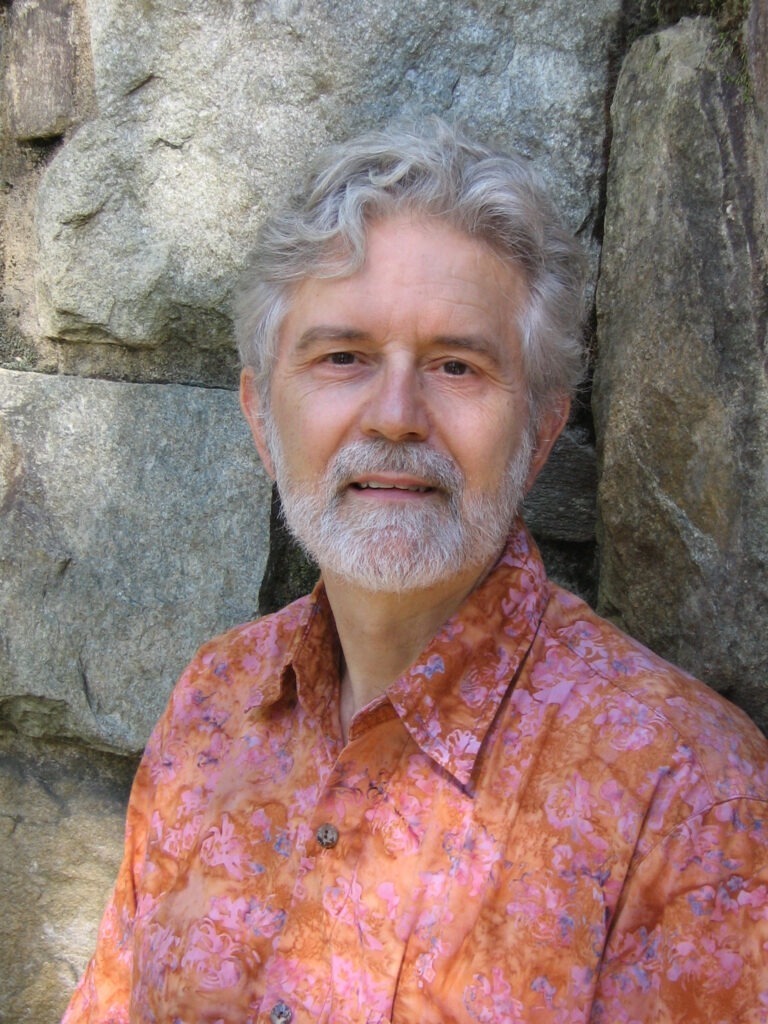
Flawn Williams – Advisor
Flawn started out singing early, harmonizing with his parents and older sister around their South Carolina home and on road trips in their ’54 Ford. Other influences included church choirs, novelty records on the jukebox at the local A&W root beer stand, and both the reborn traditional songs and the socially-conscious new songs of the 1960s “Folk Revival.”
He’s led workshops and informal jams at Augusta since 1982 in shape note singing, shanties, vocal improvisation, doo-wop, and other topics from his determinedly-eclectic repertoire. Since 1997, Flawn has coordinated Augusta’s Vocal Week program. He also has performed in many Washington Revels productions in the DC area.
Flawn’s singing credits include harmony vocals on albums by Bryan Bowers, John McCutcheon, Ginny Hawker & Kay Justice, Jennifer Armstrong, Ann Porcella, Pete Kennedy, and others, as well as singing on holiday specials for NPR’s All Things Considered. He also produced Cathy Fink’s solo album ‘The Leading Role,’ and Ginny Hawker & Kay Justice’s duo album ‘Signs and Wonders.’
He wrapped up a decade of teaching music recording and podcasting techniques at Georgetown University in 2019, and continues to produce podcasts for Malcolm Gladwell and other clients.
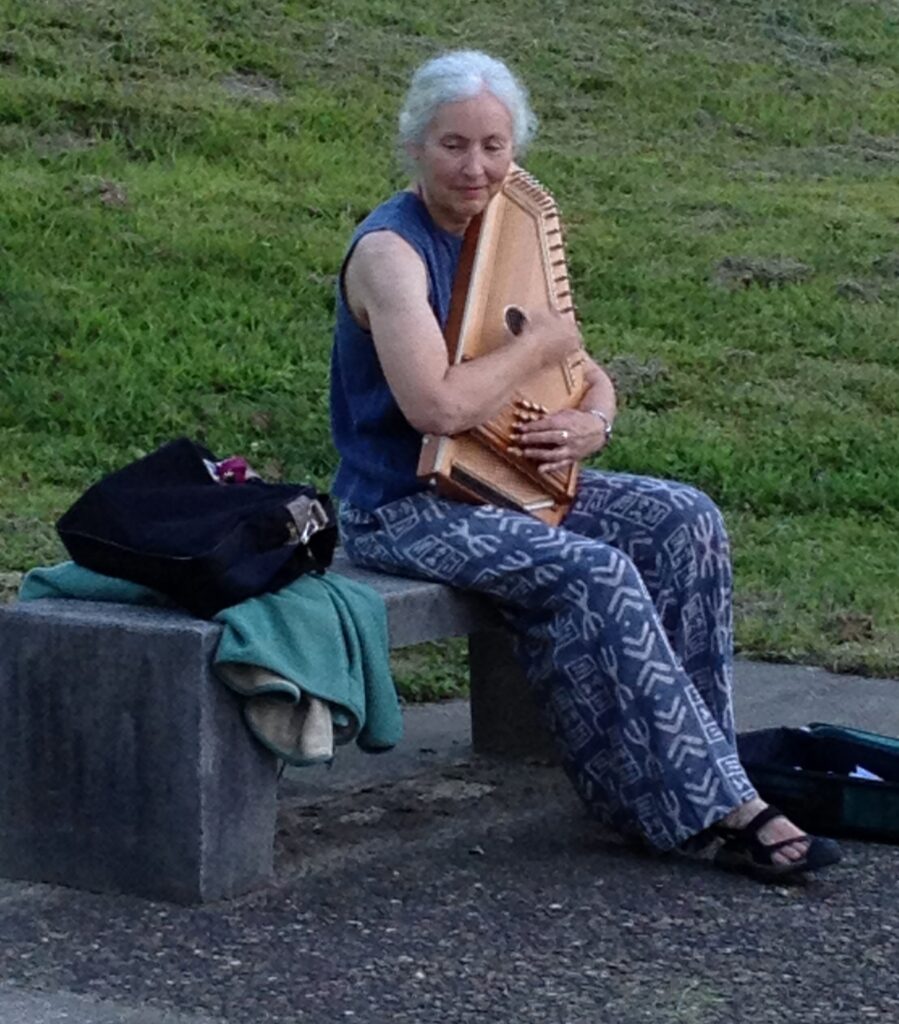
Penny Anderson
Penny Anderson is a life-long singer of choral music and traditional folksong. She is classically trained in music theory, voice, and piano, but not enough to ruin her singing. She has a repertoire of several hundred traditional folk songs from the American, British Isles, and French traditions. She has written dozens of original songs and choral pieces.
Penny’s musical obsessions at the moment are organizing the Pittsburgh monthly shape-note sing, singing a grab-bag of music from many eras as part of the duo Monongahela Harmony, composing and arranging choral pieces and solo songs, singing with the Compline Choir in the University of Pittsburgh’s Heinz Chapel, and playing the concertina. She would rather sing than do anything else.
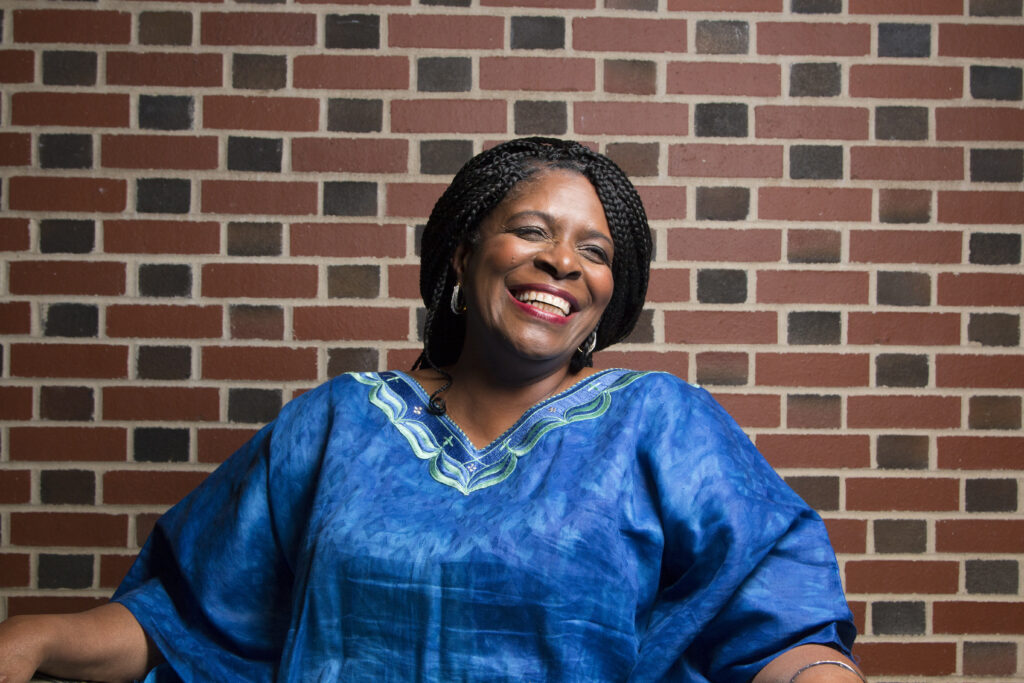
Dr. Kathy Bullock
Dr. Kathy Bullock is an educator, scholar, singer, accompanist, arranger and choral conductor who specializes in gospel music, spirituals and classical works by composers from the African diaspora. A Professor Emerita of Music from Berea College, Berea, Kentucky, she currently teaches, performs, and conducts workshops and other programs on African American music throughout the United States, Europe, and Africa.
Dr. Bullock earned a Ph.D. and M.A. in Music Theory from Washington University in St. Louis, MO, and a B.A. in Music from Brandeis University, MA. At Berea College she taught Music Theory, African-American Music, World Music, and other courses in music and general studies. She also directed Berea’s Black Music Ensemble, a choral ensemble that specializes in African American sacred music, developing a small student-run ensemble into an accredited, diverse, and exciting course that averaged seventy students each semester. Additionally, Dr. Bullock designed and led new international study courses in Ghana, Zimbabwe, and Jamaica. In her role as administrator she actively participated in the college’s governance structure throughout her tenure; she was chair of the department, and member of primary governance committees. Dr. Bullock received many acknowledgements for her contributions to Berea College. In particular, she was awarded the highly coveted Seabury Award for teaching, and was later made an Honorary Alumni of the college. Although she has now retired from fulltime teaching, Dr. Bullock recently joined the faculty of the University of Kentucky, School of Music as an adjunct, teaching and providing master classes in African American music.
Dr. Bullock’s presentations include workshops on spirituals and gospel music and explorations of musical connections between African American culture and West African and Appalachian cultures. Other research areas include the Music of the Civil Rights Movement, and African American Women’s Contributions to the Women’s Suffrage Movement. Dr. Bullock teaches and performs at schools, universities, churches, community organizations, throughout the US, educational programs such as the Kentucky Humanities Council, and singing camps such as the Swananoaa singing camp in North Carolina and workshops in Findhorn Foundation in Forres, Scotland. Recently, Dr. Bullock was the first artist at the John C. Campbell Folk School to teach about Appalachian and African American Musical Connections. Other research projects include the completion of an edition of art songs by contemporary African-American composers.
In response to the 2020 pandemic Dr. Bullock created a series of inspirational videos online, performing songs of faith and hope. Indeed in all of her work, Dr. Bullock shares infectious joy and inspires heartfelt connections as she celebrates the transcending power of love and spirit through music.
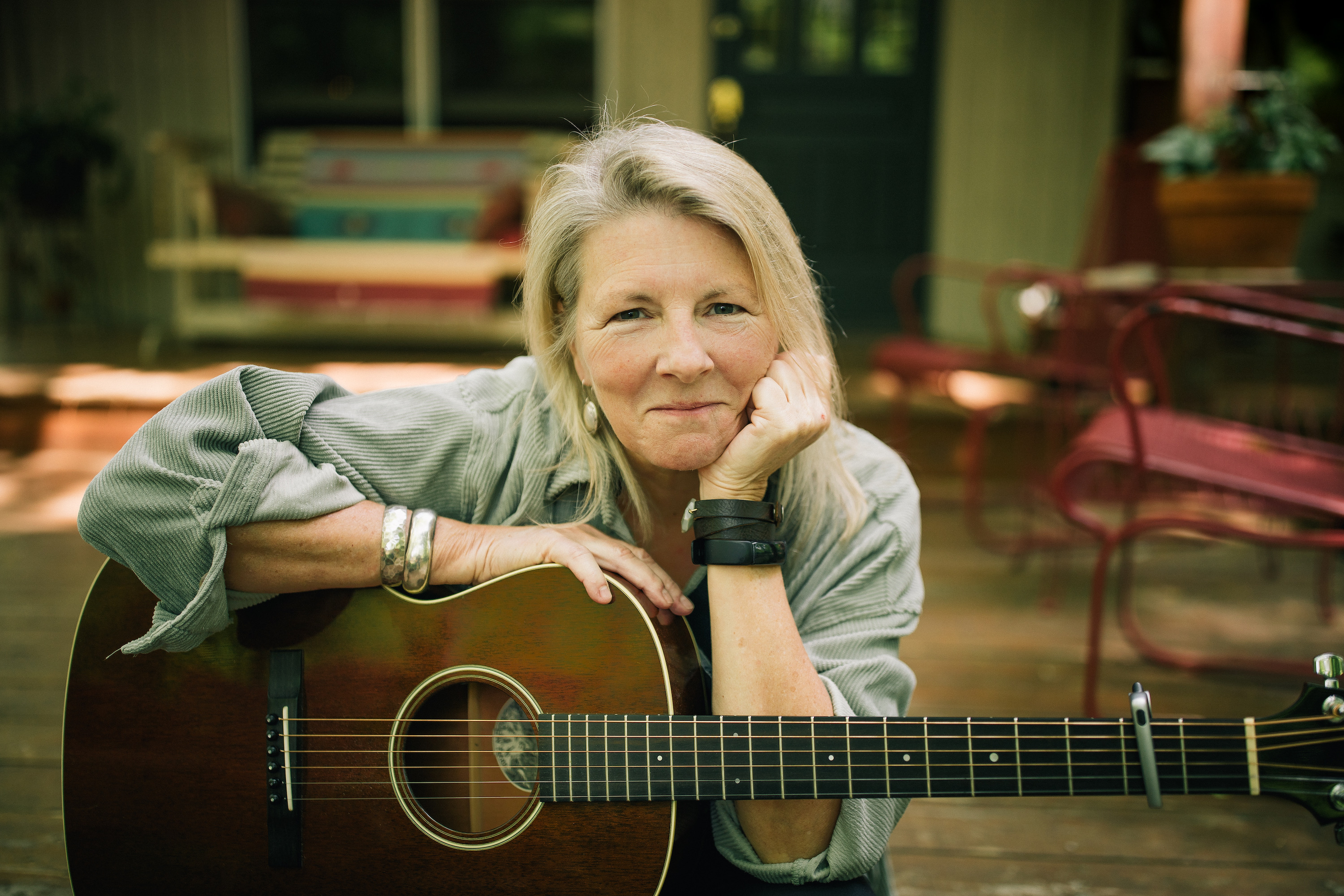
Laurelyn Dossett
Singer/songwriter Laurelyn Dossett lives and writes in Stokes County, NC. Her songs have appeared in film and television (Hell on Wheels, Ain’t In it for My Health) and have been recorded by many artists including Grammy-winning Levon Helm (Anna Lee) and Rhiannon Giddens of the Carolina Chocolate Drops (Leaving Eden). She has written the songs for seven plays, staged at Triad Stage and Playmaker’s Repertory. Her song cycle, The Gathering: A Winter’s Tale in Six Songs was commissioned by the North Carolina Symphony and premiered in Raleigh in 2011. She last performed it in 2019 with the Winston-Salem Symphony. Laurelyn has written songs for various protest movements in North Carolina including My Beloved Enemy and Vote Against Amendment One. She remains a voice for social justice and environmental activism in North Carolina and beyond. The River’s Lament is her testament to the devastation of the Dan River coal ash spill. She founded and continues to host the annual “Songs of Hope and Justice” at the North Carolina Folk Festival. Laurelyn has taught songwriting and singing at the Augusta Heritage Center, as well as at many universities, workshops and festivals. She is the recipient of the Betty Cone Medal of Arts, the North Carolina Arts Council Fellowship for songwriting, the Chris Austin songwriting contest at Merlefest, and has been a fellow at the Virginia Center for Creative Arts.
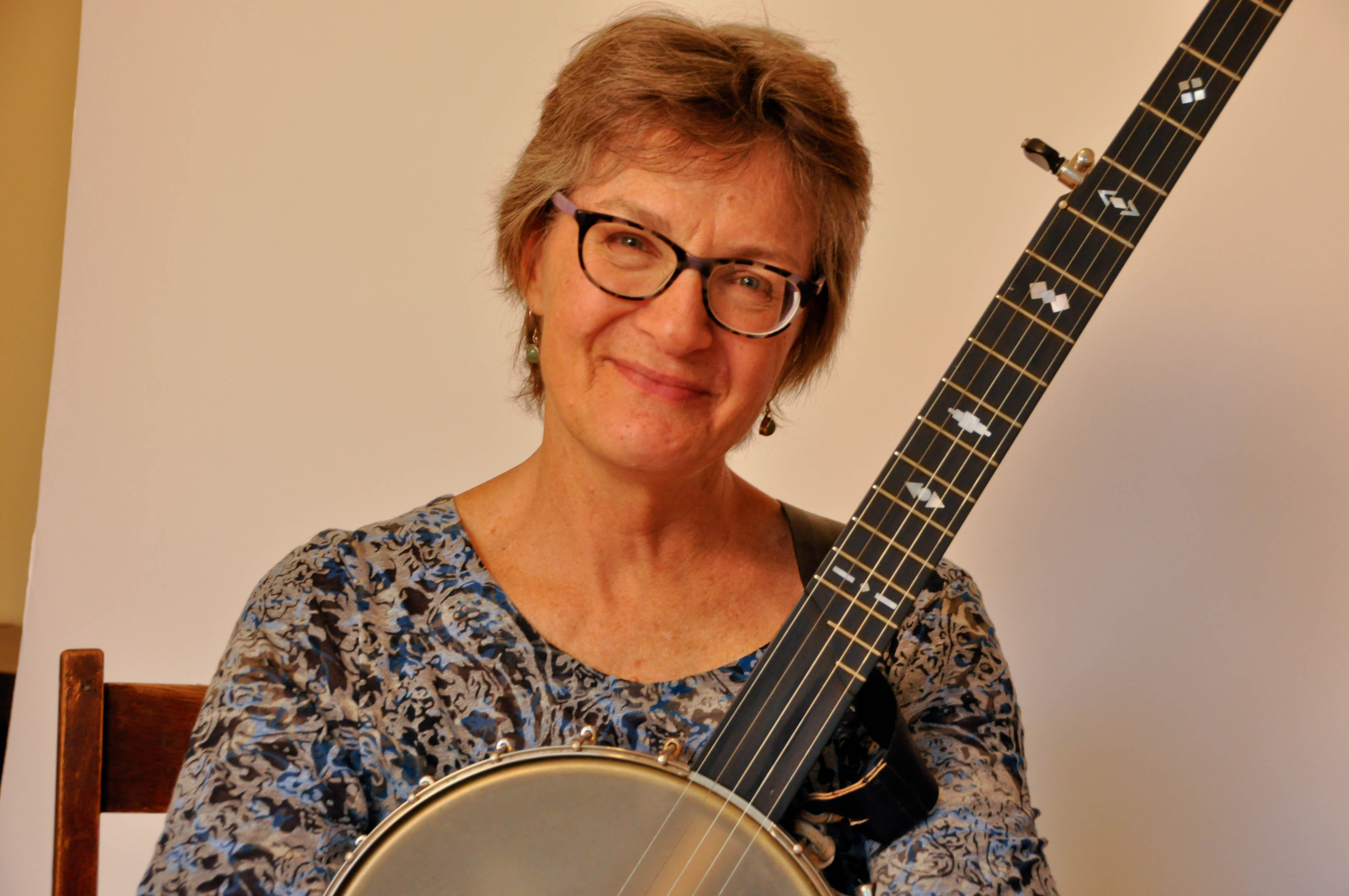
Ann Downey
Ann Downey sings and plays upright bass, clawhammer banjo, and guitar and sits in comfortably with old time Appalachian, cowboy, country, swing (country and jazz), bluegrass, Celtic, and klezmer music. She enjoys wacky songs, yodeling and especially exploring and singing harmonies. She grew up listening to her parents sing in harmony in the car during their many moves, and upon arrival was promptly plugged into the local Methodist church choir before they even unpacked. Ann’s roots are in the southwestern U.S, and she has lived and played around Europe and North America, and is now well settled in Ottawa, Canada. She has sung, played, traveled and recorded with Finest Kind (now retired), Sneezy Waters, the Toasted Westerns, Tony Turner, and Shirt-Tearing Boys among many others. She’s also regularly on call to play bass and sing harmony vocals on folk related projects in the studio and on stage. Ann has taught cowboy songs, harmony vocals and yodeling at festivals and music camps (including Augusta), and currently teaches clawhammer banjo at Alcorn Music Studios in Ottawa.
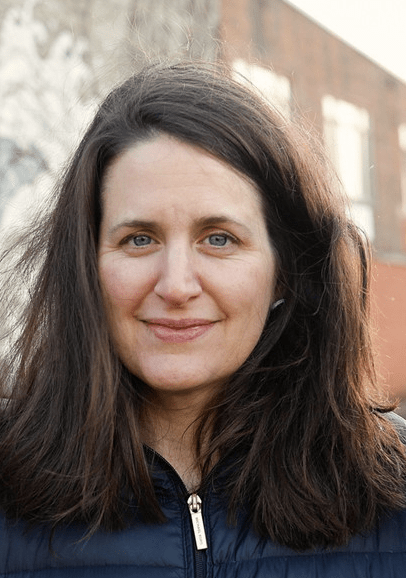
Emily Eagen
A native of Cincinnati, OH, Emily lives and works in NYC as a performer, songwriter, and teacher, where she divides her time between folk music, early music, and new music. Emily has worked with artists such as Meredith Monk, Ann Hamilton, Annie Dorsen, and Bang on a Can, and is a teaching artist for Carnegie Hall, where she leads Lullaby songwriting workshops for parents and families and hosts the video series “Sing with Carnegie Hall.” As part of a Carnegie Hall commission, Emily co-wrote Nooma (2019), an immersive opera for babies ages 0-3, and co-wrote songs for the album A Colorful World by Falu, which won a Grammy for Best Children’s Album in 2022. Also a specialist in early music, Emily is the Assistant Festival Director at Amherst Early Music, and weaves elements of medieval and renaissance music into her original work. Emily teaches vocal harmony and vocal technique at the Jalopy Music Theater and School of Music, and is a professional whistler and two-time International Whistling Champion. Emily was a founding member of NYC’s old time/blues/bluegrass band The Whistling Wolves, and currently can be heard with the vocal improvisation ensemble Moving Star, the close-harmony trio Up At Dawn, and on her forthcoming album of songs for the young and young at heart.
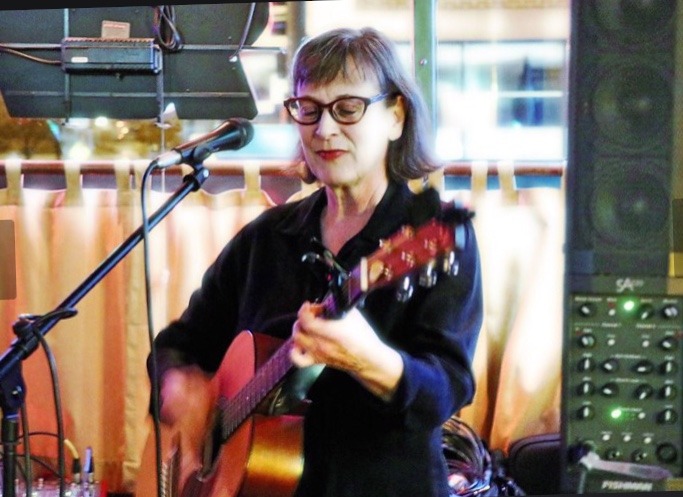
Annalee Koehn
Annalee Koehn is a Chicago-based singer and musician. She is a founding member of the fiddle-driven bands Blackest Crow and Ship of Fools, and her current project with musician and producer Chuck Cox. She is releasing a new album in 2024 and can also be heard on a variety of other recordings by The Old Town School of Folk Music, Blackest Crow, Mark Dvorak, Blue State Cowboys, Sweeter Gift, Urban Djin and others. She concurrently maintains an independent art and design practice and teaches at The School of the Art Institute of Chicago.
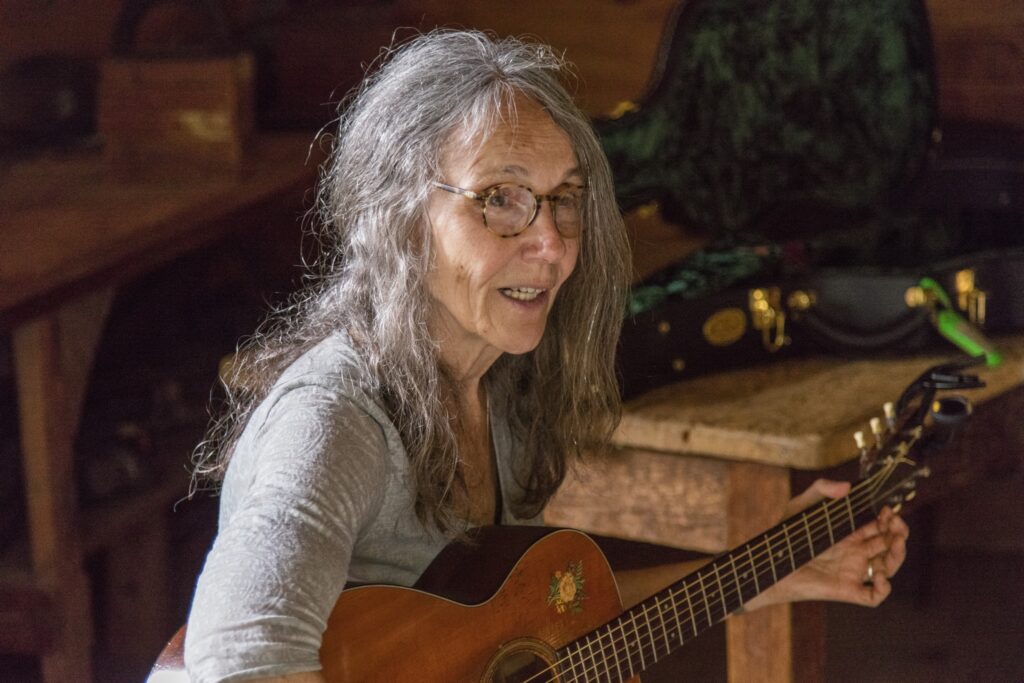
Val Mindel
Val Mindel is a longtime musician, teacher and workshop leader, known for helping singers achieve the sound they want and have fun doing it. She teaches a wide range of harmony styles from the buzzy sound of American old-time and early country harmony to the weaving harmonies of songs from across the ocean. In the process she addresses such indefinables as tone, ornamentation and lead singing. In addition to being a regular on staff at the Augusta Heritage Center, she has taught at numerous music camps elsewhere in the U.S. and abroad, including SongRoots, Targhee Music Camp, Ashokan Music and Dance Camps, Centrum’s Voice Works, Pinewoods and Sore Fingers. She is a founding member of the California-based Any Old Time string band (check out the band’s compilation album I Bid You Goodnight on Smithsonian Folkways), and has two CDs with daughter and old-time country musician Emily Miller (In the Valley and Close to Home). Val is also the author of So You Want to Sing Folk Music, part of the “So You Want to Sing” series for Rowman & Littlefield and the National Association of Teachers of Singing. She is in the process of cowriting with Dr. Kathy Bullock a chapter on traditional singing for the upcoming Oxford Handbook of Voice Pedagogy. She lives in Elkins, West Virginia.
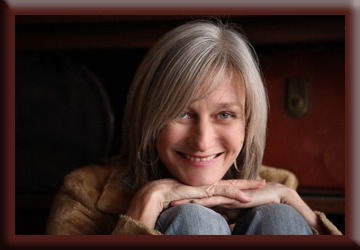
Kari Sickenberger
Kari has been leading singing classes and workshops since 2004. She is a founding member of the Original Roots Country band, Polecat Creek, and has been singing in the Asheville Honky Tonk band, The Western Wildcats, for over a decade. She has toured, recorded, and taught with Ginny Hawker and Tracy Schwarz, and leads singing workshops around the country and in Mexico. She draws on her vast experience as a Spanish and English teacher and her lifelong love for and experience with music to create a safe, encouraging, and FUN environment for new and experienced singers alike. See www.karisickenberger.com for more information.
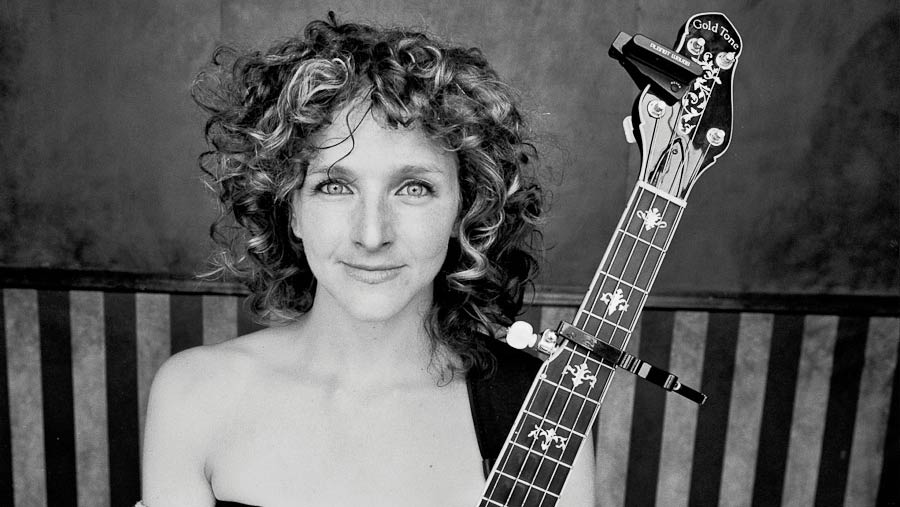
Abigail Washburn
If American old-time music is about taking earlier, simpler ways of life and music-making as one’s model, Abigail Washburn has proven herself to be a bracing revelation to that tradition. She — a singing, songwriting, Illinois-born, Nashville-based clawhammer banjo player — is every bit as interested in the present and the future as she is in the past, and every bit as attuned to the global as she is to the local. Abigail pairs venerable folk elements with far-flung sounds, and the results feel both strangely familiar and unlike anything anybody’s ever heard before.
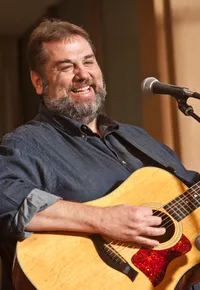
Matt Watroba
If you ask Matt Watroba, he will be quick to tell you that he is first and foremost a community singer. He is also a radio host and podcast producer, a music journalist, a father, a husband, a teacher, and a recent inductee to the Folk Alliance International Folk D.J. Hall of Fame. Matt is a published writer, having penned dozens of articles and reviews for Sing Out!, the national magazine of American folk and roots music founded by Pete Seeger in 1950.
His love of folk music led him to public radio where he has been producing and hosting programs for almost 40 years. Currently he can be heard on Michigan State Public Media and on the podcast, No Root, No Fruit—a history of folk, roots, & America music, one record at a time.
Matt also devotes much of his professional musical career to teaching and leading community sings in the Detroit area and across the country. He has conducted singing workshops for Wheatland Music Association, Summersongs, the Swannanoa Gathering, the Fox Valley Festival, and the Old Songs Festival, just to name a few. Propelled by the work of Pete Seeger, Matt has vowed to inspire or lead one hundred community sings every year.
Matt brings a unique set of talents to the stage as an educator, performer and master of ceremonies. His passion for bringing community together through music and education is infectious. Add to that Matt’s own special brand of humor and you will see why he is a respected and sought-after presenter and teacher in the world of folk and roots music.
